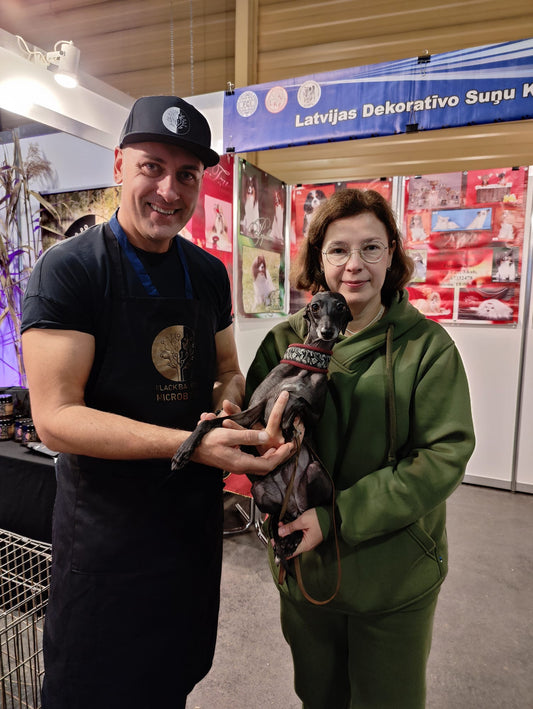
Why I’m Such a Black Stuff Buff Vol.1
Share
What am I missing?
We live in a time our ancestors could not even dream about in many respects. Science and technology bring many new discoveries all the time, everything is becoming more interconnected, diseases are being treated with more success, mental health receives more attention, and there is recorded advice for almost everything. So why do I feel so confused, distracted, and not happy and myself, body and soul?
To find order in chaos
One of the reasons can be information overload. We find information everywhere, but its relevance differs wildly. Each of us lives in a bubble of ‘truths’ and self-confirming illusions. What is the objective truth, the Holy Grail of all people, and where can we find it, anyways? It likely does not exist, not now, not later. We are all different. Our genes vary, as do our epigenetic marks and the context in which we grew up and live. So, even though our bodies and minds require similar material and immaterial necessities in general, the manner and execution will be different for everyone. As a species, we share the same biology, but as individuals, we differ. We cannot be sure which way to choose because there are simply too many ways, and there is not one right choice. Certain physical and mental health issues are on the increase, such as diseases of civilisation or chronic illnesses, stress, sleep and digestive disorders, sudden mood swings, skin conditions, and irregular bowel movement… These issues are so common nowadays, that we have come to consider them a natural part of everyday life. We do not see them as problems anymore, just accept them. We have forgotten (or perhaps we never knew it) that this does not have to be our status quo, a stable point in our life which accompanies us day and night.
We find ourselves far below the optimum level of functioning of our bodies. This is partly caused by an excess of stress and stimuli, partly by lack of wholesome food fed by quality feed or grown on quality substrate which does not consist only of inorganics, but also of live microorganisms and organic compounds. We eat food produced by intensive farming, the soil is overexploited, fruits and vegetables lack aroma and taste, even though that is what our senses are for. Some people might object – “But I buy healthy food, a lot of legumes, fruits and vegetables from local farmers, most of them organic.” However, if you feel fluctuations in your energy level and suffer from chronic problems in spite of that, keep reading. The core of the problem may lie on a different level than we tackle.
Anyone with an interest in a healthy lifestyle realises how important it is to eat foods rich in minerals. Although these have no nutritional value in themselves, they serve as essential cofactors of important enzymes in our body, and they transport water, for example. That is why they control most processes in the body – regeneration, growth, nervous impulses, metabolic regulation and digestion. They are absolutely essential.
All minerals are irreplaceable in our organism:
- Magnesium, phosphorus and manganese are necessary for the production of ATP – a source of energy in the body;
- the immune system requires copper, zinc, iron and selenium;
- we need iron, manganese, zinc, copper, magnesium, potassium or iodine for hormonal regulation;
- calcium, magnesium, phosphorus, zinc, manganese, and boron are important for healthy bones;
- cobalt, zinc, copper, potassium, manganese, magnesium, iron, calcium, and molybdenum are necessary for vitamin and enzymatic metabolism;
- our blood circulatory system needs iron and copper;
- for the nervous system, in turn, potassium, sodium, calcium, zinc, selenium, magnesium, iron, chromium, copper, iodine, and lithium are indispensable.
Do supplements actually work?
If we find out that we are deficient in some mineral, we start taking dietary supplements. Often to no avail, unfortunately. The amount consumed orally does not matter so much; what matters is the bioavailability – the amount that gets to the organs and cells to be absorbed and used. The same is true for medication – not always is the entire dose absorbed by the body and that is something to take into account when planning the dosage. Bioavailability is affected by many factors – our health, our microbiome, epigenetic setting, level of stress, the ability to transport the compound through the gut epithelium… Thus the expensive dietary supplements often become an “expensive poo” without the desired effect.
Let’s now have a closer look at the transportation of these compounds in the organism. Most minerals need help to be absorbed. Such help may come in the form of chelation. Chelation is the process of bonding of an organic compound to a cation, most often metal, resulting in a complex chelate. In other words it is a process of decomposition, binding, and transporting of mineral compounds in the digestive tract. This way the minerals pass through the intestinal epithelium into the bloodstream and can be transported to their destination – to a certain organ and its cells. It is important that the resulting chelated complex not be too large because its bioavailability then decreases significantly. It has also been found that unlike vitamin absorption, chelation and mineral absorption is highly inefficient in our body and a lot of minerals just pass through us, unused (remember the expensive poo?). As I am sure you know, any sort of nutrient, vitamin, or mineral deficiency causes a multitude of health complications and can lead to illness, in extreme cases even to death.
So how can we enhance mineral absorption? You will find out in my next article.
Original text: https://www.systers.bio/magazin-systers/proc-jsem-paf-z-black-stuff-vol-1/
Bibliography:
- Bielik, V.; Kolisek, M. Bioaccessibility and Bioavailability of Minerals in Relation to a Healthy Gut Microbiome. Int. J. Mol. Sci. 2021, 22, 6803. https://doi.org/10.3390/ijms22136803
- Judith R. Turnlund (1991) Bioavailability of dietary minerals to humans: The stable isotope approach, Critical Reviews in Food Science and Nutrition, 30:4, 387-396, DOI: 10.1080/10408399109527549 https://www.tandfonline.com/doi/abs/10.1080/10408399109527549
- https://www.systers.bio/en/why-im-such-a-black-stuff-buff-vol-1/

Kristýna Zezulová
Molecular & neurophysiology scientist,
Systers Bio s.r.o. https://www.systers.bio/en/about-us/
Kristýna has a cosmic quantity of questions in her head. However, the whole universe and its wise secrets are also found in the brain, and only through it. Through purely scientific experiments, even those that have been sewn on their knees for generations, they try to understand the body, mind, and peace around us and within us. She loves thinking in the open air and her life oscillates around balance.




